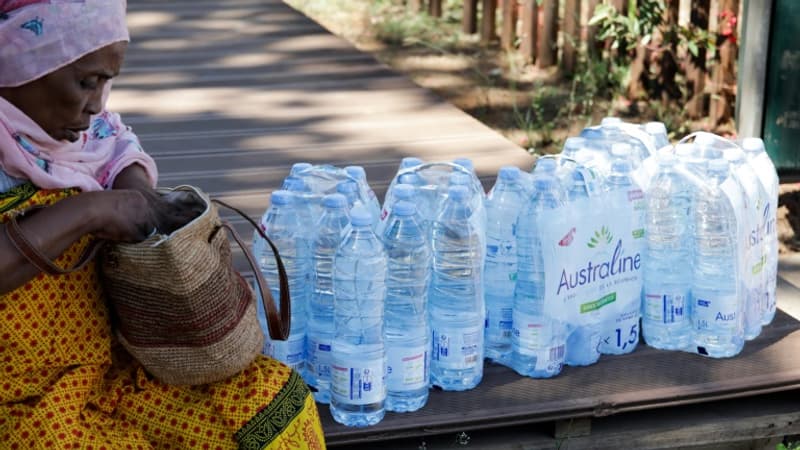An increasingly complicated health situation. Mayotte, affected by a serious drought, will experience new restrictions on the distribution of water from Wednesday, although Public Health France indicates that the lack of hygiene has favored the gastroenteritis epidemic.
Starting Wednesday, the period of access to water, maintained one day in three, will be “reduced to 18 hours instead of 24 hours,” the Mayotte prefecture indicated Monday afternoon in a press release, with the objective of “preserving deductions until mid-November.
Distributions
France’s poorest department, located on the Indian Ocean, is suffering its worst drought since 1997, while its supply depends largely on rainwater, stored in two reservoirs in the hills.
“Despite the progressive extension of blackout periods, the level of hill reservoirs continues to decline at an alarming rate,” warns the prefecture.
The Combani reservoir, in the center of the island, is 13.6% full, the Dzoumogné reservoir, in the north, 7% full. “At the current rate of extraction, the complete emptying of the hill reservoirs will occur at the end of October. From this date, the department will have less than half of its water needs,” adds the prefecture.
According to Floriane Ben Hassen, head of Météo France in Mayotte, “the rains we are currently experiencing do not allow for significant accumulation.” According to her forecasts, the rainy season would begin in mid-November, with normal intensity. “But temperatures, above average, could favor water stress,” she adds.
The government announced on Thursday several measures to address the most urgent needs, in particular covering water bills from September to December for the 310,000 Mahorais and expanding to 110,000 or 120,000 the number of people who will benefit from free water distribution. bottled up. .
The Minister of Foreign Affairs, Philippe Vigier, however, indicated on Tuesday before the Assembly that the distribution of bottled water in Mayotte “will be extended to the entire population within a few weeks.”
“Major health threat”
These restrictions on access to drinking water “probably lead to an intensity and duration of the epidemic (of gastroenteritis, editor’s note) greater than those observed in previous years,” notes Santé Publique France in a report published on Tuesday, which takes stock of the situation as of October 6.
“The epidemic continues because there is less hygiene due to lack of water and people take fewer precautions,” underlines Youssouf Hassani, head of France’s Public Health unit in Mayotte.
The number of cases of acute gastroenteritis began to increase again during the last week of September, after two weeks of decline. The public health agency notes a “high level” of emergency room visits for gastroenteritis, “of all ages combined.”
“Since the beginning of the gastroenteritis epidemic, there have been 13 serious cases admitted to intensive care at the Mayotte hospital center,” the report states.
Epidemic outbreak?
The participation of antidiarrheals and oral rehydration solutions in the sales of pharmacies in the region is higher than the average of previous years, at a level “the highest since the beginning of the year,” it also indicates.
La Santé Publique France also monitors possible epidemics of cholera, hepatitis A, typhoid fever and poliomyelitis and warns of “the significant threat to the health” of a Maori population that, “for the majority of them, is in a very precarious situation” .
“Due to their mode of transmission and the periodic detection of sources of contamination in the territory, these water-borne diseases could be the subject of epidemic outbreaks due to water shortages in Mayotte,” the agency warns.
“We know that some patients, the most disadvantaged, who cannot afford bottled water, also drink water from rivers. This is the worst, it especially causes epidemics of typhoid fever,” underlines a nurse at the hospital in Mayotte, who wish to remain anonymous. In fact, this disease is endemic in the territory.
“Last year we recorded 123 cases. Currently there are nine,” says Youssouf Hassani.
Source: BFM TV


